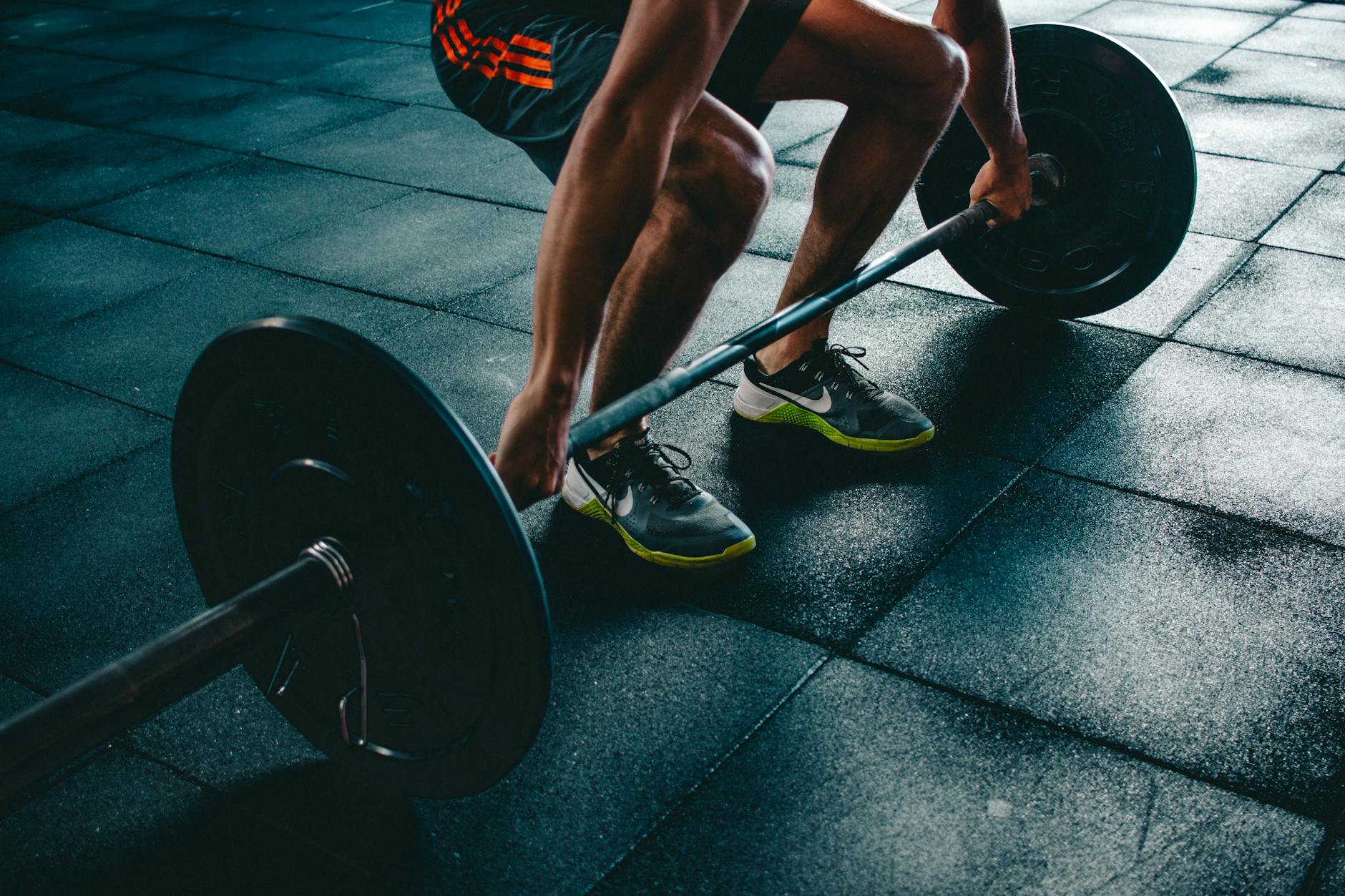
Have you ever wondered what it takes to become a competitive weightlifter? 💪 Imagine waking up with one goal in mind: to push your body to its absolute limits. For these athletes, every day is a carefully orchestrated symphony of dedication, sweat, and iron.
From the moment they open their eyes to the final rep of the day, competitive weightlifters live a life that's anything but ordinary. It's a world where every meal is calculated, every rest period is sacred, and every lift could mean the difference between victory and defeat. But what exactly goes on behind the scenes? What fuels these modern-day titans, both physically and mentally?
Join us as we dive into "A Day in the Life of a Competitive Weight Lifter". We'll explore the rigorous morning routines that set the stage for success, the intense training sessions that push physical boundaries, and the crucial nutrition strategies that fuel peak performance. We'll also uncover the importance of rest and recovery in optimizing gains, and delve into the powerful mindset that gives these athletes their competitive edge. Prepare to be inspired and amazed by the dedication it takes to excel in this demanding sport! 🏋️♀️🏆

Morning Routine: Setting the Stage for Success
Early wake-up call: Importance of consistency
Competitive weightlifters understand that success begins with a consistent morning routine. Waking up at the same time every day, typically around 5:00 AM, helps regulate the body's circadian rhythm and sets a disciplined tone for the day ahead.
Mobility exercises and stretching
After rising, a weightlifter dedicates time to mobility work and stretching:
-
Dynamic stretches
-
Foam rolling
-
Joint mobilization exercises
-
Static stretches for problem areas
This routine helps improve flexibility, reduce injury risk, and prepare the body for the intense training session to come.
Nutrient-packed breakfast for energy
A well-balanced breakfast is crucial for fueling the body. Here's a typical meal plan:
| Food Item | Purpose |
|---|---|
| Oatmeal | Complex carbs for sustained energy |
| Eggs | High-quality protein for muscle repair |
| Banana | Quick-acting carbs and potassium |
| Greek yogurt | Additional protein and probiotics |
| Nuts | Healthy fats and micronutrients |
Mental preparation techniques
Successful weightlifters don't just train their bodies; they also train their minds. Common mental preparation techniques include:
-
Visualization of successful lifts
-
Positive self-talk and affirmations
-
Goal setting for the day's training session
-
Mindfulness meditation to improve focus
By following this structured morning routine, competitive weightlifters set themselves up for success, both physically and mentally. This disciplined approach lays the foundation for the rigorous training session that follows, ensuring they're ready to push their physical limits and make progress towards their competitive goals.

Training Session: Pushing Physical Limits
Warm-up Protocol for Injury Prevention
A proper warm-up is crucial for competitive weightlifters to prevent injuries and maximize performance. Start with 5-10 minutes of light cardio to increase blood flow, followed by dynamic stretches targeting major muscle groups. Incorporate mobility drills specific to weightlifting movements.
Main Lifts: Technique and Programming
Focus on the core Olympic lifts: snatch and clean and jerk. Implement a structured program that includes variations of these lifts to improve technique and strength. Here's a sample weekly program:
| Day | Main Lifts | Sets x Reps |
|---|---|---|
| Mon | Snatch | 5 x 3 |
| Clean & Jerk | 4 x 2 | |
| Wed | Snatch Pull | 4 x 4 |
| Clean Pull | 4 x 4 | |
| Fri | Power Snatch | 4 x 3 |
| Power Clean | 4 x 3 |
Accessory Exercises for Balanced Development
Complement main lifts with accessory work to address weaknesses and prevent imbalances:
-
Front and back squats
-
Overhead presses
-
Pull-ups and rows
-
Core strengthening exercises
Cool-down and Recovery Strategies
After intense training, implement a cool-down routine:
-
Light stretching
-
Foam rolling
-
Ice baths or contrast therapy
-
Proper hydration and post-workout nutrition
Tracking Progress and Adjusting Goals
Regularly monitor performance using:
-
Training logs
-
Video analysis
-
Periodic max-out sessions
Adjust your program based on progress and upcoming competitions. Remember, consistency and proper technique are key to long-term success in competitive weightlifting.

Nutrition: Fueling the Body for Performance
Macro and Micronutrient Requirements
For competitive weightlifters, a well-balanced diet is crucial. The following table outlines the recommended macronutrient distribution:
| Macronutrient | Percentage of Daily Calories |
|---|---|
| Protein | 25-30% |
| Carbohydrates | 45-55% |
| Fats | 20-30% |
Micronutrients are equally important, with a focus on:
-
Iron for oxygen transport
-
Calcium and vitamin D for bone health
-
B vitamins for energy metabolism
Meal Timing Around Training Sessions
Proper meal timing is essential for optimal performance:
-
Pre-workout: Consume a meal rich in complex carbs and lean protein 2-3 hours before training
-
Post-workout: Ingest a mix of fast-absorbing carbs and protein within 30 minutes after the session
-
Throughout the day: Eat balanced meals every 3-4 hours to maintain energy levels
Hydration Strategies
Staying hydrated is critical for weightlifters. Here's a simple hydration plan:
-
Drink 16-20 oz of water 2-3 hours before training
-
Sip 7-10 oz of water every 10-20 minutes during the workout
-
Consume 16-24 oz of water for every pound lost during training
Supplements: Necessities vs. Extras
While whole foods should form the foundation of a weightlifter's diet, certain supplements can be beneficial:
| Necessity | Extra |
|---|---|
| Whey protein | BCAAs |
| Creatine | Pre-workout boosters |
| Multivitamin | Beta-alanine |
Now that we've covered the nutritional needs of a competitive weightlifter, let's explore the importance of rest and recovery in optimizing gains.

Rest and Recovery: Optimizing Gains
As we delve into the crucial aspect of rest and recovery, it's important to understand that this phase is just as vital as the training itself for competitive weightlifters. Let's explore the key elements that contribute to optimizing gains during downtime.
Active Recovery Techniques
Active recovery plays a significant role in maintaining mobility and promoting blood flow without overtaxing the muscles. Here are some effective techniques:
-
Light cardio (e.g., swimming, cycling)
-
Yoga or stretching routines
-
Foam rolling and self-massage
-
Low-intensity bodyweight exercises
Importance of Quality Sleep
Quality sleep is paramount for weightlifters, as it's during this time that the body repairs and grows. Consider the following:
| Sleep Factor | Benefit for Weightlifters |
|---|---|
| Duration | 7-9 hours for optimal recovery |
| Consistency | Regular sleep schedule enhances hormonal balance |
| Environment | Dark, cool room promotes deeper sleep |
Stress Management Practices
Managing stress is crucial for both mental and physical recovery. Weightlifters can benefit from:
-
Meditation or mindfulness exercises
-
Deep breathing techniques
-
Regular massage therapy
-
Engaging in hobbies or relaxing activities
Balancing Training with Daily Life
Competitive weightlifters must find equilibrium between their rigorous training regimen and personal life. This balance is essential for long-term success and overall well-being. Strategies include setting realistic goals, prioritizing tasks, and allocating time for social activities and rest.
Now that we've covered the essential aspects of rest and recovery, let's explore how the right mindset can give weightlifters a competitive edge.

Mindset: The Competitive Edge
The mental aspect of competitive weightlifting is often the deciding factor between victory and defeat. A strong mindset can propel an athlete to new heights, enabling them to push beyond physical limitations and achieve remarkable feats.
Goal-setting and Visualization
Successful weightlifters understand the power of setting clear, achievable goals and visualizing their success. Here's a breakdown of effective goal-setting techniques:
-
Short-term goals (daily, weekly)
-
Medium-term goals (monthly, quarterly)
-
Long-term goals (yearly, career-spanning)
Visualization involves mentally rehearsing perfect lifts, competition scenarios, and overcoming challenges. This practice enhances confidence and performance.
Overcoming Mental Barriers
Mental barriers can be as challenging as physical ones. Common obstacles and strategies to overcome them include:
| Mental Barrier | Strategy to Overcome |
|---|---|
| Fear of failure | Reframe failure as a learning opportunity |
| Self-doubt | Positive self-talk and affirmations |
| Performance anxiety | Breathing exercises and meditation |
Developing Resilience and Grit
Resilience and grit are crucial for long-term success in weightlifting. These qualities enable athletes to bounce back from setbacks and maintain focus on their goals. Developing a growth mindset, embracing challenges, and learning from failures all contribute to building mental toughness.
Pre-competition Rituals
Many weightlifters develop pre-competition rituals to center themselves and enter the optimal performance state. These may include:
-
Listening to motivational music
-
Performing specific warm-up routines
-
Reciting personal mantras or affirmations
Handling Success and Failure
A balanced approach to both success and failure is essential for maintaining a healthy competitive mindset. Celebrate victories without becoming complacent, and view losses as opportunities for growth and improvement. This perspective allows weightlifters to stay motivated and focused on continuous progress throughout their careers.

The life of a competitive weightlifter is a delicate balance of rigorous training, meticulous nutrition, and unwavering mental fortitude. From the moment they wake up until they rest their heads at night, every action is purposeful and aimed at achieving peak performance. The intense training sessions push their bodies to the limit, while carefully planned nutrition fuels their muscles and aids in recovery. Rest and recovery periods are equally crucial, allowing the body to repair and grow stronger.
What truly sets competitive weightlifters apart, however, is their mindset. The mental strength required to consistently push boundaries, overcome setbacks, and maintain focus is paramount to success in this demanding sport. As you embark on your own fitness journey, remember that the principles of dedication, proper nutrition, and mental resilience apply to all levels of athletic pursuit. Whether you're aiming for the Olympic podium or personal health goals, adopting the disciplined approach of a competitive weightlifter can help you achieve remarkable results.